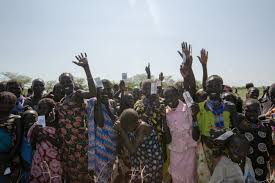“This is a year of peace. Anybody that has benefited from our suffering, you go and look for something to eat from somewhere else not from our blood!”, says the Acting Governor of Jonglei area at the end of a two-day peace dialogue in Bor, funded by UNDP – the United Nations Development Programme – in collaboration with the UN Mission in South Sudan (UNMISS).
By Mach Samuel
The dialogue, which brought together 30 participants, including youth leaders, women leaders and traditional chiefs, created a platform for the communities of Lou Nuer, Murle and Dinka of Bor to identify sources of conflicts and find amicable solutions.
The triggers of skirmishes across the conflict-ridden region are mostly cattle-raiding, child abduction, disputes over grazing land, and territorial wrangling, among others.
The Murle, who are generally accused of crimes such as cattle raiding and child abduction, in turn accuse their neighbours, the Dinka and Nuer, of similar crimes. Although some of the local authorities have tried to improve the relationship among these neighbouring communities in the past, peaceful; co-existence has remained elusive.
A peace dialogue was thus necessary to sensitize the respective communities to adopt dialogue as a mechanism for peaceful resolution of conflict and end the triangle of conflict in Greater Jonglei.
The acting governor of Jonglei Ding Akol Ding said political entities that trigger some of these inter-communal conflicts – which eventually translate into inter-state conflicts – need to be countered.
“Time has come for us to tell those spoilers of peace, whether among youth or among politicians: ‘please you are wrong. We don’t want more bloodshed in Greater Jonglei and South Sudan’,” Ding said, noting that the international community had invested in the revitalized peace agreement.
He said the peace agreement was the last chance for the people of South Sudan.
“This revitalized peace agreement is the only solution to our problems in South Sudan. If we don’t implement this agreement, those who are leaders will regret their leadership,” he warned.
The war in South Sudan has displaced millions to refugee camps across the region, and displaced thousands of others internally.
The UNMISS Head of Office in Greater Jonglei Deborah Schein said she hoped the participants would return to their communities and be ambassadors for peace.
“We believe if the foundations are strong, the people will come together, and this peace will be real, and it will bring prosperity to the people of South Sudan,” she said.
“We came from the IO side because we need peace to grow among us,” said the opposition chairperson of Peace the Commission in Bieh area, Muot Chuol.
Besides the appeal to end bloodshed, some of the resolutions reached and signed by the community leaders included establishment of a joint peace committee.
The resolutions also encouraged the government and community leaders to continue and promote the recovery of abducted children and cows.
Additionally, youth were urged to desist from violence and channel their energies into promoting community development and peaceful co-existence.
The three communities urged the government and peace partners to open effective communication channels, including roads and telecommunication networks, as some areas remained inaccessible since conflict erupted in 2013.
The Nuer, Murle and Dinka also pledged to promote trade among themselves, beseeching the government to undertake comprehensive disarmament throughout the country.


